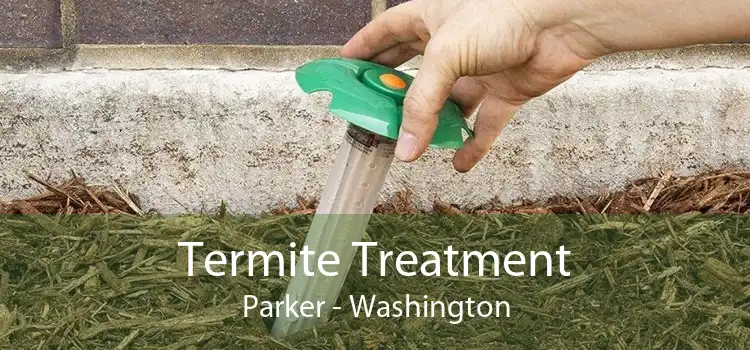Get Quality Termite Treatment in Parker, WA From Skilled Pest Control Experts. Professionals Offer Liquid Termite Treatment And Wood Termite Treatment Options.
All Day Pest Control Parker offers the best termites treatments in Parker, WA. Don't Wait to get Professional Termite Exterminator help. These pests can cause significant damage, and fast action is critical to prevent further infestation. Our expert team at All Day Pest Control Parker specializes in effective termite treatment services and has the experience and tools to deliver long-term protection against these destructive insects.

Termite Treatment Near Me in Parker, WA
Termite infestations can cause a lot of damage to your home or business, but seeking professional help can be expensive. Most people don't know where to start when it comes to the Treatment Of Termites, and many are scared of the cost. Our team of experienced professionals offers a variety of services that will suit your needs and budget. We have a wide range of termite treatments near you in Parker, WA, so you can find the perfect solution for your home or business. Give us a call at 877-724-3734 for more information.
Best Termite Treatment in Parker, WA
Termites can cause a lot of damage to your home or office, and if you're not careful, they can quickly become an expensive problem. If you've ever had termites, you know how quickly they can cause Serious Damage To Your Property. Not only do they eat away at the wood in your home or office, but they can also compromise the structural integrity of the building. Our Best Termite Treatment in Parker, WA is designed to protect your home or office from all Types Of Termites and wood-destroying insects. We use the latest technology and techniques to get rid of these pests for good.
Wood Termite Treatment in Parker, WA
 Termites are a huge problem in the Parker, WA area, and they can cause a lot of damage in a short amount of time. If you Find Termites In Your Home, it's important to call our professionals for Wood Termite Treatment right away. We'll work with you to create a treatment plan that fits your needs and budget. Our Pest Control Professionals have the experience and knowledge necessary to help you get rid of termites quickly and minimize the damage they've caused.
Termites are a huge problem in the Parker, WA area, and they can cause a lot of damage in a short amount of time. If you Find Termites In Your Home, it's important to call our professionals for Wood Termite Treatment right away. We'll work with you to create a treatment plan that fits your needs and budget. Our Pest Control Professionals have the experience and knowledge necessary to help you get rid of termites quickly and minimize the damage they've caused.
Termite Treatment Company in Parker, WA
Termite damage can be a costly issue for homeowners, and left untreated can cause even more damage. Termites are relentless and can cause a lot of damage to your home or office if left untreated. Our Termite Treatment Company in Parker, WA offers the Best Termite Treatment And Control Service to protect your home or office from these pesky pests. We also use the latest technology and equipment to detect and provide Rodent Control in Parker, WA. Contact us today for a free consultation!
Liquid Termite Treatment in Parker, WA
 Traditional methods of termite treatment like pesticides or traps can be dangerous and ineffective. Liquid Termite Treatment is the safe, effective solution for getting rid of these pests for good. Our team uses eco-friendly liquid treatments that will Eliminate Termites without harming you, your family, or the environment.
Traditional methods of termite treatment like pesticides or traps can be dangerous and ineffective. Liquid Termite Treatment is the safe, effective solution for getting rid of these pests for good. Our team uses eco-friendly liquid treatments that will Eliminate Termites without harming you, your family, or the environment.
Pest Control Termite Treatment in Parker, WA
Not only can termites cause a lot of damage, but they can also be very expensive to get rid of. If you think you may have a Termite Problem, it is important to address it as soon as possible. Our pest control experts offer Pest Control Termite Treatment in Parker, WA that will help Get Rid Of Termite Infestation, and also help prevent future infestations from happening. We use the latest technology and techniques to provide you with the best possible service.